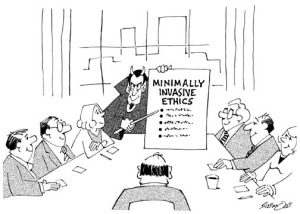 Far too many of the processes set up by business and government are designed to fail, or at best rely on altruism and trust to get the ‘right thing’ done. A typical example is safety or quality check lists; its not unusual to see people spending an hour on a Friday afternoon filing in the sheets for the week and then sending them off to be filed. A complete waste of time! The problem is not the people, it’s a system failure; causes of the observed symptom may be:
Far too many of the processes set up by business and government are designed to fail, or at best rely on altruism and trust to get the ‘right thing’ done. A typical example is safety or quality check lists; its not unusual to see people spending an hour on a Friday afternoon filing in the sheets for the week and then sending them off to be filed. A complete waste of time! The problem is not the people, it’s a system failure; causes of the observed symptom may be:
- The process is unnecessary (the work was done safely or to standard anyway);
- The process is excessively bureaucratic forcing people to choose between getting the job done or getting the paperwork done; or
- Undetected errors occurred.
Regardless of the cause, the system has failed!
The first question to ask comes out of ‘Light’ and ‘Lean’ thinking; is the process needed at all, and if it is needed can it be made easier to do properly? A key element in this part of the redesign is asking the question does the process add more value than it costs?
Assuming the process is needed the next area of redesign is making the system self-correcting, in other words designing the system so that it is easier to comply with the process than to circumvent it. This requires some imagination.
A good example is the visiting security guard at some of our local shops. In the ‘old days’ the guard was required to slip a card under the door to let the shop owner know the check had been done – if 2 or 3 checks were scheduled overnight, the equivalent number of cards were to be found in the morning. The flaw in the system was no one knew if the guard had visited at the designated times or had called once and slipped several cards under the door……..
The new system has a small RIFD tag fixed to the shop wall and the guard as a reader. If this system is exploited fully, not only is the timing of each visit recorded, but the safety of the guards is enhanced because a failure to ‘read’ the tag at the correct time can trigger an alarm in the guard’s organisation that something has gone wrong, a simple phone call can check if he’s held up in traffic or a more serious situation has occurred.
Every situation is different, but one example of a seriously flawed government process that could easily be improved is the issuing of 457 visas. The Temporary Work (Skilled) visa (subclass 457) allows skilled workers to come to Australia and work for an approved business for up to four years. The key requirements of the scheme include paying Australian wages and complying with the law. It costs about $2,000 for a visa.
The purpose of this class of visa is to overcome temporary skills shortages in the Australian job market whist local workers are trained; a highly desirable purpose. There are significant penalties for defrauding the system but for reasons discussed in Lynda’s post on ‘Making Ethics Effective’, far too many people are prepared to ignore the low risk of prosecution to make money. 457 workers are employed as shop assistants and waiting staff in food outlets in cities with 6% unemployment. The system relies on trust and the department is understaffed to adequately enforce the rules. So how could this defective system be redesigned to make it self -correcting??
Step 1 – look at the fundamental objectives – skilled workers, temporary employment, and the training of permanent Australian workers. Skilled workers are paid between $50,000 and $100,000 per annum.
Step 2 – price the visa properly, the 457 visa is an alternative to training, training a worker costs at least $6,000 per annum – price the visa accordingly. Set the fee for the visa at $6,000 for the first year and allow 4 or 6 extensions of 6 months each at $6,000 per extension. This cost will focus company management on the desirability of training local workers!
Step 3 – price the risk properly, 457 visa holders are supposed to go home at the end of their work, require a $10,000 bond payed at the time of approval (ie, before the worker arrives) that is released once the worker permanently leaves Australia. This sound a lot but reputable businesses can obtain bank guarantees at around 0.75% of the amount guaranteed = $75 per worker per year and all that is needed is a couple of tweaks to the visa control processes to record a permanent departure.
Step 4 – eliminate some of the obvious areas of abuse; eg, make it illegal for a 457 holder to change employers. If the employee is terminated and does not leave the country, the $10,000 bond is forfeit.
Step 5 – compensate the legitimate businesses to help offset these additional costs. Legitimate businesses that comply with the law will pay their superannuation guarantee for most 457 visa holders. For a worker on $75,000 per annum this is about $7,000 a year. Temporary workers who are leaving Australia have no need for a statutory superannuation fund – exempt all 457 visa holders from the payment (some are already). This will offset the cost for most legitimate organisations in the first year. By the second year they should be starting to bring trained workers into play.
What this proposed redesign of the system does is minimise the impact on legitimate businesses that are using 457 visas for their intended purpose and are complying with the obligation contained within the scheme to train people. But the revised system will really hit the dodgy operators who are using the 457 visa to import cheap unskilled labour, particularly if they are underpaying wages and not paying statutory entitlements.
Fixing 457 visas is fairly simple and can be introduced for new applications to minimise complications, the old visas will expire in due course; and as an added bonus the government will have additional revenues to help stamp out malpractice in other classes of visa.
Fixing the other ‘headline making fraud’ of the VET training subsidies will be more difficult, but a shift towards payment on successful completion of the training (backed up by audits) would go a long way towards eliminating the dodgy operators……. VET FEE-HELP is supposed to encourage people to become qualified for work, not enroll in courses!
Enrollment is a key step towards qualifying, but pay for what you want (qualified people in the job market), not an interim step that is of no value in itself. At present 100% of the money is paid on enrollment – driving dodgy course providers to focus on maximising enrollments, no one worries too much if people don’t finish the course, don’t qualify or don’t get a job. Why not pay 75% of the money on successful completion and the remaining 25% on the person achieving employment? This would encourage education providers to only engage people who are capable of completing the course and only provide courses that are likely to lead to employment – the government pays for the results it says it wants.
We’ve looked at some problems that are making headlines locally, now there’s the question of your organisation’s systems – how many rely on trust and goodwill to be implemented properly with the remote possibility of sanctions if someone is caught not complying, and how many have self-correcting checks and balances in a lean and light framework that drive correct behaviour? Good Standard Operating Procedures improve consistency and reduce costs, but only if they are used (see: The value of Standard Operating Procedures).
As Lynda concluded in ‘Making Ethics Effective’, achieving ethical and proper behaviours requires more than hoping for a good outcome, intentional design is needed – hope is not a strategy!









